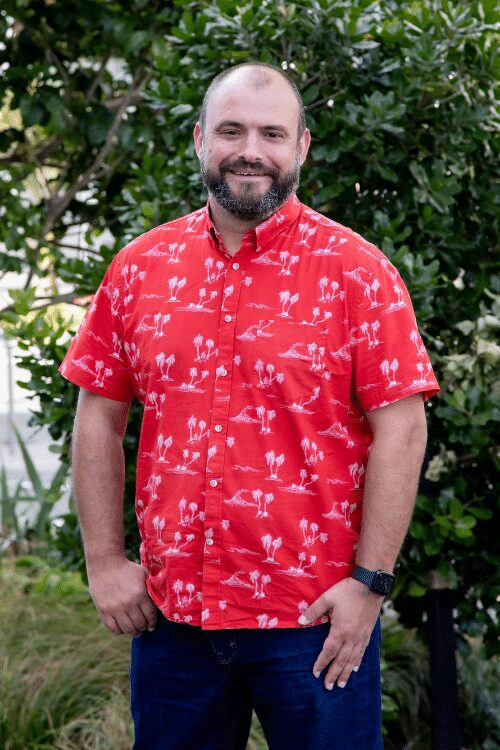At SuiteFiles, we’re proud to have a team that blends deep industry expertise with a passion for innovation. Among our stellar senior leadership team is Daniel Rock, our Chief Revenue Officer, whose wealth of expertise and market insights empowers us to continue growing. We recently sat down with Dan to get insights into his professional journey and the strategy for success he brings to SuiteFiles.

Can you share with us the journey that led you to become a Chief Revenue Officer? What were some pivotal moments in your career?
Oh, where to start? My career began in tech, deeply embedded in the IT world. I guess I was your typical techie, solving business problems with technology. I had this pivotal moment when I shifted from being an IT guy in New Zealand to diving into tech sales. Never did sales before that, and here I was, thrown into the deep end about 20 years ago. My path certainly wasn’t linear; it involved moving around, trying different things, and eventually, I fell in love with the impact and quick turnaround of SaaS solutions. Fast forward, I found myself selling to accountants, of all things, which introduced me to the intricate world of tax trading. This variety of roles taught me the importance of understanding the business from a technology and sales perspective, ultimately leading me to my role as a Chief Revenue Officer. It’s been about building from scratch, driving change, and believing in a product-first, market-second approach.
How would you describe your leadership style and philosophy? How has it evolved over your career?
My leadership style? I’d say it’s evolved from being directive to enabling. I take an empowerment approach where my focus is on setting people up for success, giving them the tools they need, and then stepping back to let them shine, though always being available for guidance. I’ve learned the importance of situational leadership and the value of listening over telling. There’s humility in acknowledging you don’t have all the answers and fostering an environment where your team feels safe to experiment, fail, and learn. This shift towards a more collaborative and supportive approach has fundamentally changed how I lead.
In today’s rapidly changing market, what innovative strategies do you believe are key to driving revenue growth? How do you balance short-term gains with long-term growth?
Magic bullets don’t exist in driving revenue growth, especially in a market that’s always changing. The focus should be on building a sustainable model that balances immediate wins with long-term growth. This involves being intimately familiar with your numbers, understanding the levers that drive growth, and making decisions that may not always be in your immediate personal or departmental interest but are right for the business. Another aspect is customer education and engagement. Today’s customers are incredibly well-informed, so the game has changed from selling to them to engaging with them in meaningful conversations about how our solutions can solve their unique challenges. It’s about creating value beyond the product itself.
How do you foster a culture of performance and collaboration within your teams?
Creating a culture where performance and collaboration thrive starts with making it a safe space for your team. They need to feel comfortable taking risks and making mistakes, knowing they’re learning opportunities, not failures. Recognizing good work immediately and providing constructive feedback is key. I remember this instance where recently, I had members of my team having a robust discussion on differing opinions – and it got pretty heated at points! Instead of jumping in to solve the conflict, I let them navigate it, guiding them only when necessary. This approach has encouraged open dialogue, trust, and ultimately, a collaborative team spirit.
Mentorship can play a crucial role in career development. Can you talk about a mentor who has impacted your career, and how you approach mentorship within your organization?
Mentorship has been a cornerstone of my career development. I was lucky to have mentors like David Cole, who guided me through the transition from a high-performing salesperson to a people leader. His insights helped me understand the importance of stepping back, allowing others to grow, and making space for failure and learning. My mentors didn’t just provide advice; they challenged my perspectives, pushing me to think beyond the immediate and consider the broader impact of my decisions. This has instilled in me the importance of continuous learning and adaptation.
In my role, I strive to pass this on by creating a mentorship culture within our organization where more experienced team members are encouraged to share their knowledge and insights with newer colleagues. This isn’t about formal training sessions; it’s about creating an environment where asking questions, seeking advice, and sharing experiences is part of our daily routine. It’s about fostering an ecosystem of growth, where everyone, regardless of their role, feels they have something to learn and something to teach. This has led to a more cohesive, agile, and proactive team that’s better equipped to tackle the challenges we face in the market.
What advice would you give to aspiring leaders who aim to reach executive positions, particularly in revenue-focused roles?
To aspiring leaders, I want to stress the importance of developing a multifaceted skill set. Understanding the financial and operational aspects of the business is crucial, but so is cultivating soft skills like empathy, communication, and strategic thinking. Leadership at the executive level involves a delicate balance between driving performance and nurturing the human element of your team. It’s about envisioning where the market and the company are headed and steering your team toward that future with conviction and adaptability.
Also, I can’t encourage enough for young leaders to actively seek out diverse experiences within their organizations. This could mean leading projects outside your comfort zone, working in different departments, or engaging with customers directly. These experiences provide invaluable insights into the business’s inner workings and help develop a holistic understanding of what drives success.
Lastly, never underestimate the power of networking and relationship building, both within and outside your industry. The connections you make can provide new perspectives, insights, and opportunities that are crucial for personal and professional growth. Leadership is a continual evolution of self. You must be self-aware and know what you are good at and what you’re not. Without that, it becomes much harder to guide others and every interaction, challenge, and experience is a step forward on that path.
If you’d like to experience the SuiteFiles difference firsthand, book a demo with our team today via the button below



